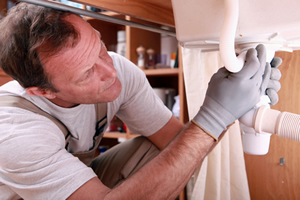Monday, October 27, 2025
7 Early Plumbing Failure Signs Homeowners Miss And How To Fix Them

Small plumbing clues often point to bigger problems waiting in the walls or under the slab. If you spot any of the warning signs below, a quick check from a pro can prevent water damage and stressful surprises. For issues that need expert attention, schedule dependable plumbing repairs with Sahuarita Plumbing.
Why Early Signs Matter In Corona De Tucson
Our desert climate is tough on pipes. Hard water can leave scale that narrows lines and stresses fixtures, and summer monsoon humidity can hide moisture problems until they turn into stains or mold. Many homes in Corona de Tucson sit on slab foundations, so leaks can travel before you ever see a puddle.
- Hard water scale speeds up wear on valves, faucets, and water heaters.
- Soil movement and temperature swings can fatigue older pipe joints.
Sign 1: Slow Drains In More Than One Room
One sluggish sink is often a simple clog, but slow drains in both the bath and kitchen point to a deeper restriction. In our area, mineral buildup and early root intrusion can narrow main lines long before a full backup.
What It Means Locally
Scale from hard water in Corona de Tucson adds grit to the inside of drain lines. Add a monsoon season and yard growth, and a minor restriction can become a system-wide slowdown.
How A Pro Fixes It
A licensed technician evaluates the main line with a camera, clears the obstruction with the right method for your pipe material, and confirms full flow so the problem does not return.
Sign 2: A Sudden Drop In Water Pressure
Pressure changes that affect every fixture often indicate a supply issue, a failing pressure regulator, or a hidden leak before the fixtures. If it is only one bathroom or one floor, the cause may be localized.
What It Means Locally
Pressure regulators work hard in areas with scale. Mineral grit can wear internal parts, and older homes around the Santa Rita foothills may have original regulators nearing the end of their life.
How A Pro Fixes It
Your plumber measures static and working pressure, tests the regulator, and inspects for hidden leaks. Repairs restore a stable, safe flow without stressing appliances.
Sign 3: Banging, Whistling, Or Clicking Pipes
Noises often come from loose pipe supports, trapped air, or a failing valve. Whistling at a faucet points to a worn cartridge, while loud knocks right after closing a valve suggest a water hammer issue.
What It Means Locally
Scale reduces openings in shutoff valves, creating whistling sounds. Thermal changes across the day make lightly secured lines tap studs or slab penetrations.
How A Pro Fixes It
Pros secure lines, replace worn cartridges or valves, and install or recharge hammer arrestors to protect your pipes and fixtures from shock.
Sign 4: Discolored Water Or Metallic Taste
Brown or yellow water usually indicates corrosion somewhere in the system. A metallic taste can also come from hot water stored in an aging tank that is shedding rust.
What It Means Locally
High mineral content can accelerate anode rod wear in water heaters. Once protection is gone, tanks begin to corrode from the inside out.
How A Pro Fixes It
A plumber tests water at multiple points, inspects the heater, and checks visible piping for corrosion. Solutions may include replacing an anode rod, flushing sediment, or updating corroded sections.
Sign 5: Mysterious Water Bill Spikes
If your usage habits have not changed, a leak may be running quietly out of sight. Toilets that refill often or a line weeping under the slab can waste thousands of gallons.
How A Pro Finds It
Technicians isolate fixtures, monitor the meter, and use acoustic tools to pinpoint leaks within walls or flooring. Once located, targeted repairs prevent further damage and waste.
Sign 6: Warm Floor Spots Or Musty Odors
Warmth underfoot near a hallway, kitchen, or bath may point to a hot water slab leak. Long after the floor cools, a musty smell or baseboard swelling can linger.
What It Means Locally
Slab leaks are common where older copper lines contact soil and concrete. Even a pinhole can travel along the slab and appear in another room.
How A Pro Fixes It
Pros use thermal imaging and listening equipment to confirm a leak and choose the best solution, which could be a direct repair, a reroute above the slab, or a section replacement to limit future risk.
Sign 7: Popping Or Rumbling From The Water Heater
Sounds from the tank often mean sediment has settled at the bottom and is trapping steam. Rust around the base or moisture on the pan are additional red flags.
What It Means Locally
Hard water in Corona de Tucson speeds sediment buildup. Heaters work harder, which raises energy use and shortens equipment life.
How A Pro Fixes It
Your plumber inspects the burner or elements, checks safety controls, and recommends maintenance or replacement based on age and condition to help avoid unexpected outages.
Local insight: our hard water accelerates scale in fixtures, valves, and water heaters. A quick annual inspection can catch wear early and reduce emergency calls during the monsoon season when access and scheduling are tougher.
How To Read The Clues Without Opening A Wall
Most early signs are about patterns. When two or more fixtures act up at once, when noise follows a specific action, or when changes happen at the same time of day, those clues help a technician zero in fast. Keep notes about what you see and when it started, then share that timeline with your plumber.
- Group symptoms by location, like the kitchen, primary bath, or outdoors.
- Track timing, such as mornings, after laundry, or during monsoon humidity.
- Notice changes in temperature, sound, or water clarity.
When To Call A Pro Right Away
Never ignore a sudden drop in pressure across the whole home or signs of moisture near electrical or gas appliances. Acting quickly protects your flooring, cabinets, and walls, and it keeps warranties and insurance obligations on solid footing.
If you suspect a leak, contact a trusted plumber in Corona de Tucson, AZ, who can evaluate the system and stop damage from spreading. Early support from Sahuarita Plumbing keeps small problems from turning into major repairs.
What Your Plumber Will Do
Expect a careful walkthrough to confirm symptoms, followed by targeted testing. A professional brings specialized tools that minimize cutting and guessing, then explains the findings in plain language. If a part is near the end of its life, you will hear why and what the options are so you can decide with confidence.
When repairs are needed, your technician will match materials to your existing system and local codes, protect work areas, and verify results before cleanup. The goal is safe operation and reliable flow, not just a quick patch that fails later.
Preventive Moves That Pay Off In Our Desert Climate
Simple habits help systems last longer here. Use strainers to keep debris out of drains, and space out high-demand tasks like showers and laundry to reduce stress on supply lines. Consider regular water quality checks and appliance inspections so small issues are caught during routine visits.
Do not attempt major plumbing work without training, permits, and proper tools, especially around gas or electrical connections. Professional care protects your safety and the long-term health of your home.
Get Help For Small Issues Before They Grow
If any of these signs sound familiar, have a pro assess them now. When you need quick diagnostics and reliable fixes, ask about our expert plumbing repairs to restore flow and protect your home in Corona de Tucson.
Ready to stop small problems from becoming big headaches? Call Sahuarita Plumbing at 520-780-4507 to schedule your visit today.
















